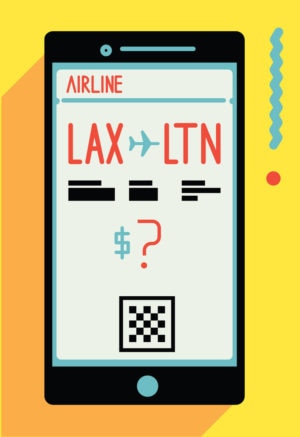The Science of Strategic Pricing: How Dynamic Flight Pricing Is Reflected in Other Markets
Share

This article is an excerpt from “One Good Idea Deserves Another,” originally published in the Innovation Issue of APEX Experience magazine.
APEX Insight: What do rainforest creatures, Uber, smart glasses and the aerospace industry have in common? A few really good ideas. This multipart feature looks at the power of industrious thinking, and how invention migrates from one industry to the next.
Even before the computer made big data mainstream, the fluid fares for airline tickets have long been determined scientifically, based on factors such as historical trends, market demand and passenger behavior.
For E. Andrew Boyd, author of The Future of Pricing: How Airline Ticket Pricing Has Inspired a Revolution, discovering the airline approach to pricing opened up a new way of looking at markets.
“I wondered what the history of airline ticket pricing foretold about the future of pricing in general,” he writes. “Would we one day find our bar of soap changing price on a minute-by-minute basis, the result of detailed mathematical algorithms conceived by some of the world’s best educated minds?”
While that hasn’t quite happened, scientific pricing has altered hotel markets, rental car markets and, most recently, the apartment rental market in New York City. Property owners have been using revenue management software to set rental rates on new and renewing leases based on the analysis of real-time data.
 Membership Mania
Membership Mania
Scientific pricing has its naysayers. “Is the fare-centric model really working?” asked Devin Liddell, principal brand strategist, Teague, during his keynote presentation at last year’s APEX EXPO.
Instead, he suggests that airlines take a few pointers from sports franchises. “One of the things we noticed from sports leagues was a really interesting trick,” he explains. “They get people to buy a season’s worth of tickets before the games even happen.”
Many airlines offer flight passes, but for Liddell, a deep dive into the sports membership model would go beyond temporary passes and tap into the long-term loyalty sports franchises build with fans.
Cord-Cutting and Unbundling
In the cable industry, streaming services like Netflix and Amazon Prime have forced traditional cable companies to reevaluate their bundled channel packages and consider pay-per-channel models.
The same unbundling is occurring in the airline industry, though it’s being met with less jubilation. An airplane ticket once entailed a number of expected services: the ability to check luggage, a meal and more. More recently, many airlines have moved toward an itemization of these products and services.
The opinion on unbundling, in both cases, is mixed. For cable, critics argue and studies show that pay-per-channel models may ultimately lead to higher prices overall for fewer channels. On the airline front, advocates argue that passengers have been liberated to pay for what they choose, while others disagree. “I think we’re totally wrong when it comes to the current trend towards unbundling,” says Liddell. “Bag fees are a fine for doing business with us … I mean, who travels with [just] the clothes on their back?”
Elevating the Cinematic Experience
Canada’s Cineplex Entertainment dabbled with airline-style pricing for its theaters. In 2014, the entertainment giant announced that it would be piloting a program at Varsity Cinemas in Toronto to determine if moviegoers would be willing to pay more for premium seating options. The result? Adult-only VIP Cinemas which, in addition to offering luxurious, reserved seats at a premium, include a VIP menu for in-theater dining, in-seat services and a bar and lounge. “It’s kind of cool. You’ve got a bar, you’ve got all the amenities and you get to see a movie in comfort,” says one patron in the theater-chain’s promotional video. Sound familiar?


